To reach international climate targets outlined by the United Nations Framework Convention on Climate Change (UNFCCC), global warming will need to be limited to 1.5°C.
Reaching this goal will require a dramatic increase in the number carbon management projects than what currently exists today. The Carbon Management Challenge (CMC) seeks to drive carbon management projects and infrastructure development to achieve this.
The CMC is a joint call to action to accelerate the scale-up of carbon capture, removal, use, and storage technologies to address carbon dioxide (CO2) emissions.
Launched in 2023, the CMC is comprised of 23 participants worldwide with an ongoing effort to expand the number of country participants. The international climate initiative was launched by Australia, Canada, Egypt, Norway, Denmark, Japan, Saudi Arabia, the European Union, the United Arab Emirates, and the United States of America at the Major Economies Forum in April 2023.

2030 to manage
CMC participants agree to take voluntary actions to advance a pipeline of carbon management projects by 2030, that when fully operational, will collectively manage 1 gigatonne (Gt) of CO2 or more annually.
Since its launch, key initiatives include climate finance for project deployment, setting national objectives, joint tracking and knowledge-sharing, and advancing the global conversation on carbon management.

24
participants from
around the world
To drive new and ambitious efforts forward, the CMC, has assembled committees, with representatives from all seven regions of participants, along with three separate workstreams focused on developing country finance, project tracking and communications, respectively.
Enabling this scale-up will require strong government commitments and leadership, along with ambitious public-private sector partnerships. Governments and project proponents also have an important role to play in ensuring that carbon management projects prioritize meaningful public participation throughout, maximizing co-benefits for the surrounding environment and community.
CMC delivery through three workstreams
Developing country project finance
Collaborating to advance existing and new financial policies to enable developing countries to support carbon management deployment.
Project deployment and project tracking
Supporting and tracking the scale up of carbon management project towards the gigaton goal by 2030, in coordination with existing efforts.
Strategic communication and engagement
Carrying the message that carbon management, in addition to other essential mitigation pathways, is integral to keeping the goal of limiting warming to 1.5°C within reach.



